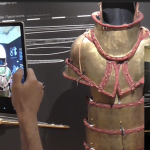MUSELEARN - Visitor modeling using computer vision and machine learning for the provision of augmented reality educational content and games
| 2 of 5 | << First | < Previous | Next > | Last >> | Back to gallery |
Museums are among the most important organizations for the preservation and the dissemination of the global cultural heritage and among of the most important educational sources and growth factors. Despite the significant advances in museology and museum organization in most museums the exhibitions are linear and non interactive by using traditional means such as audio guides or QR codes pointing to static information.
Recently interactive multimedia technologies are being exploited, however they require significant investment and they pose restrictions to the amount of additional material and the number of visitors they can serve. Furthermore, for most museums the satisfaction level of the visitors is not clear.
Given the above considerations, MuseLearn proposes to develop a system which will provide access to additional personalized digital material and will exploit technologies for object detection and visitor tracking. The intended outcome is the increase of the museum attendance.
The specific goals are:
- To develop a service for the visual detection of museum exhibits so that personalized supplementary digital material can be presented such as multimedia, augmented reality.
- To develop a service that will allow the objective and constant monitoring of the visitors’ behavior and the impact of the exhibition, thus giving a fconstant feedback to curators.
- A mobile guide application that will be able to penetrate the global market by offering high customer satisfaction and low cost.
- A guide application which will increase visitor satisfaction and museum attendance in the long term (e.g., by 50% during validation tests)
- Dissemination of the results to spread the MuseLearn merit and to allow the obsolete presentation methods to evolve. Target groups are museum administration and curators, visitors, researchers, companies active in the culture domain.
We will focus on the financial viability of the results by (a) requiring minimum museum equipment apart from the server and the wifi (b) allowing the visitors use their own devices (tablets or smart phones)[/size
MuseLearn will be developed having as a testbed the Herakleidon Museum and using real visitors for the trials. The system will be developed and commercially exploited by the Diadrasis company, which focuses on cultural applications. The laboratory of Cultural Technology of the Department of Cultural Heritage Management and New Technologies of the University of Patras will be the project coordinator and will develop the visitor profiling and the user interface. The Computer Vision and Robotics Lab of the Foundation of Research Hellas – FORTH will develop the visual object recognition mechanism.
This work is partially supported by the Greek Secretariat for Research and Technology, and the EU, Project T1EΔK-00502 within the framework of “Competitiveness, Entrepreneurship and Innovation” (EPAnEK) Operational Programme 2014-2020.
Dimitrios Kosmopoulos: Principal investigator and project coordinator.

